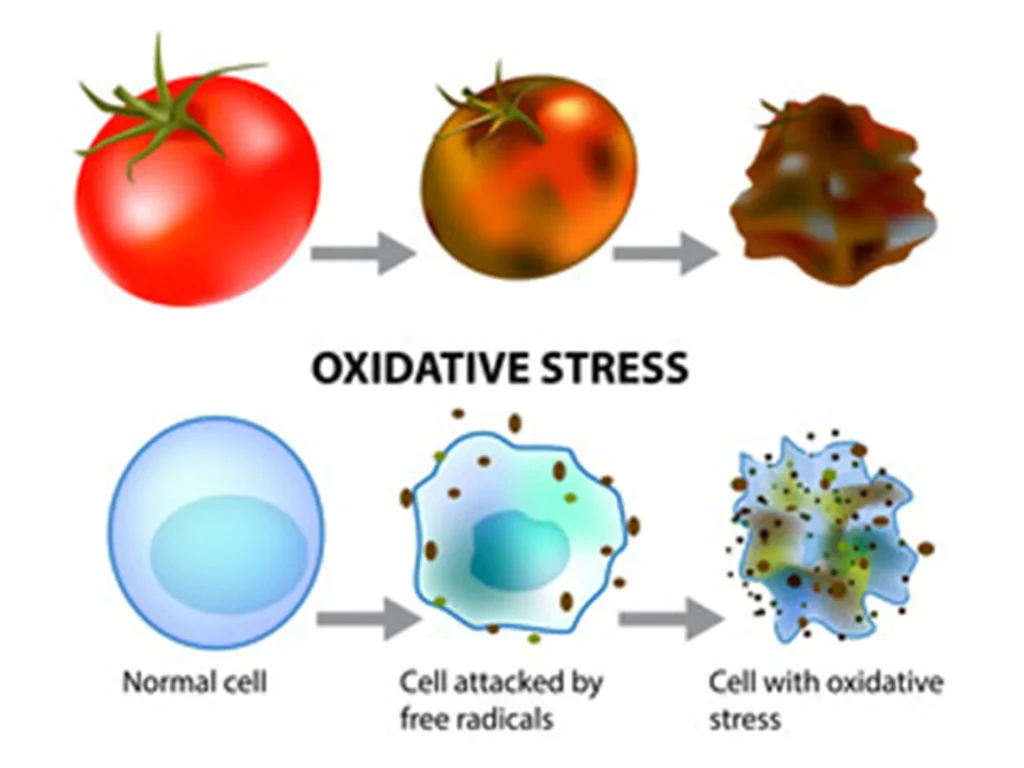
When we think about stress, the first thing that usually comes to mind is psychological stress, which the World Health Organization (WHO) defines as a state of worry or mental tension caused by challenging situations.
However, there’s another kind of stress—less talked about but equally harmful: oxidative stress. Unlike psychological stress, which affects the nervous system in a broad, systemic way, oxidative stress operates on a cellular level.
Oxidative stress is caused by unstable molecules known as free radicals, or reactive oxygen species (ROS). These molecules, due to their chemical structure, attack essential components of our cells, such as lipids and proteins. Imagine a tomato: when it oxidizes, it loses its vibrant red color and turns a dull, purplish hue—an unmistakable sign of decay. A similar process takes place inside our bodies. When free radicals accumulate, they destroy our cells, contributing to severe conditions such as cardiovascular disease, neurodegenerative disorders like Alzheimer’s, chronic inflammation like arthritis, and even cancer.
Thankfully, our bodies are equipped with natural antioxidant defenses, including vitamins A, C, and E, trace elements like selenium, and enzymes such as glutathione peroxidase. Under normal circumstances, there’s a delicate balance between the production of free radicals and our antioxidant defenses. But when this balance shifts in favor of free radicals, oxidative stress sets in, bringing with it potentially dire consequences.

Source : innoaesthetics.com
Free Radicals and Psychological Stress: An Overlooked Connection
Why should we care about oxidative stress? Because it’s not just caused by external factors like pollution, smoking, or an unhealthy diet. It’s also deeply connected to psychological stress—a major factor often overlooked.
When we face difficult situations, our bodies don’t just respond emotionally. Chronic worry, anxiety, and mental tension trigger chemical reactions that ramp up the production of free radicals. In this way, psychological stress becomes a key driver of oxidative stress, creating a vicious cycle where mental and physical deterioration feed into one another. But here’s the important part: stress doesn’t arise from the situations themselves—it’s all about how we respond to them. As the philosopher Epictetus wisely said: “What troubles men is not things themselves, but their judgment of those things.”
This truth is echoed in sacred texts. In Matthew 6:34, the Bible advises: “Do not worry about tomorrow, for tomorrow will worry about itself. Each day has enough trouble of its own.” Worry acts like an invisible assault, affecting both mind and body.
Crimson: A Symbol of Inner Destruction
To better understand this dynamic, let’s turn to a story from the Book of Exodus. When God provided manna to the Israelites, they were instructed not to save any for the next day. Yet, some hoarded it out of fear of scarcity. By the following morning, the manna was infested with worms and emitted a foul stench.
The Hebrew word for “worm” in this passage, Towla, also refers to a crimson dye extracted from the Coccus ilicis insect. When this insect dies, it releases a deep crimson fluid, a color often associated with decay and the death of cells.
This biblical image remains relevant today. Just as the manna, a symbol of sustenance, rotted due to unnecessary worry, excessive and persistent anxiety causes internal harm. The free radicals produced by psychological stress attack our organs and lead to the gradual destruction of our cells. The crimson hue—linked to decay—becomes a powerful metaphor for cellular death. It reminds us that our worries can literally “stain” our organs, disrupting their function and signaling the toll of unresolved stress.

When the Mind Calms, the Body Heals
To prevent our organs from being covered in that symbolic crimson, it’s essential to build habits that nurture both mind and body:
- Adopt an antioxidant-rich diet: Include foods like berries, spinach, and nuts, which help neutralize free radicals.
- Manage psychological stress: Engage in activities like meditation, prayer, or breathing exercises to soothe your mind and reduce tension.
- Shift your perspective: Take inspiration from Epictetus or scripture, and learn to see challenges as opportunities for growth rather than threats.
- Stay physically active: Moderate exercise not only reduces stress hormones but also boosts the body’s natural antioxidant production.
In conclusion, excessive worry harms both our minds and our bodies. By learning to rebalance our thoughts and emotions, we can protect our peace of mind and the health of our organs. Let’s cultivate a calm outlook on life to shield our bodies from crimson decay—choosing vitality over deterioration.




